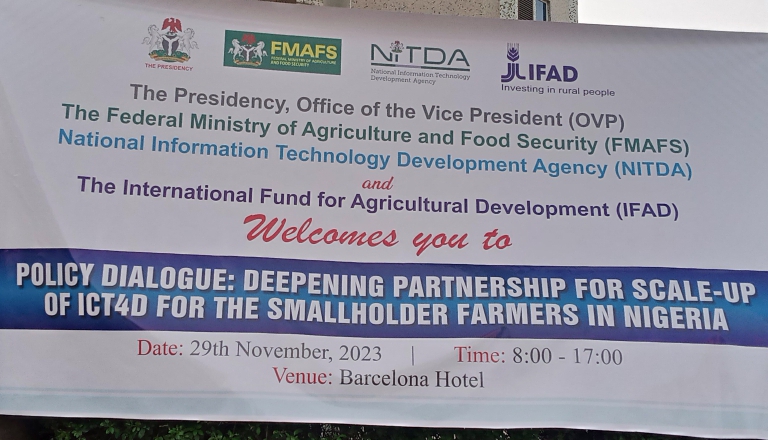By Queen Kunde
International Fund for Agriculture Development (IFAD) has organized a policy dialogue on Information and Communication Technology for Development (ICT4D) to scale up ICT4D for small holder farmers in Nigeria.
The policy dialogue which aimed at building a strong momentum of digital solutions created by the government’s determination to accelerate agricultural transformation including through technology for visible, measurable improvement in the quality of life of the people of Nigeria is expected to accelerate joint actions during the next two to three years.
Speaking at the occasion the Country Representative for IFAD Nigeria Mrs. Dede Ekue said IFAD made the commitment at a policy dialogue on deepening Partnership for Scale-up of Information Communication Technology for Development (ICT4D) for Smallholder farmers, adding that evidence has shown that ICT4D in agriculture can contribute to increasing farmer’s productivity and income, strengthen resilience to climate change and improve access to markets for farm produce.
She said ” Electronic marketing solutions can increase smallholder farmers’ income by 37percent, and their productivity by 73 percent, Electronic extension services can increase their productivity up to 75percent, digital financial services can increase their income by 18percent on average and their productivity receives boost by 25-50 percent.
Also speaking during the Policy dialogue, the Director General of the National Information Technology Development Agency (NITDA) Inuwa Abdullahi said Nigeria agricultural sector can contribute $67billion annually to the nation’s Gross Domestic Product of the country if digital technology is fully deployed into the sector.
Inuwa reveal that “Nigeria is 22 times bigger than Netherlands in land size but Netherlands is the second largest producer of agriculture produce due to the deployment of technology”.
“If we use technology in agriculture it can boost productivity by 67percent, today Nigeria’s GDP is about $477billion, if agriculture is contributing 21 percent then that is about $100million, when technology is applied then the figure can increase by 67percent,” he stated.
He further stated that President Tinubu has mandated the Ministry of Communications and innovation to accelerate the growth of the economy by deploying technology innovations to enhance productivity in critical sectors adding that agriculture is one of the critical sector of the economy given its contribution to the GDP.
The Senior Special Assistant to the President on Agribusiness and Productivity enhancement Dr. Kingsley Uzoma in his remarks at the event stressed that a sustained efforts in improving digital literacy in partnership with key agencies such as NITDA as well as the private sector, will be critical in achieving greater technology adoption by smallholder farmers which can translate to improved productivity, extensive technical upscaling best practices, increase trade competitiveness and market access..
He stressed the need for a centrally coordinated agricultural data hub which aggregates, analyses and provides insights on open and targeted data that is relevant for planning, policy direction and essential decision making.
Uzoma emphasized the need to apply a twin approach of developing critical technology enabling infrastructure in partnership with the Universal Service Provision Fund (USPF) and mobile network operators while driving low technology solutions such as USSD and WhatsApp to increase accessibility.
The Director planning and Policy Coordination Federal Ministry of Agriculture and food security Mrs. Kothum Ibrahim stated that ICTs are key to enable poverty reduction, address inequalities and propel the country towards Food security adding that evidence has shown that growth of the agriculture sector is two to three times more effective at reducing poverty than an equivalent amount of growth generated in other sectors.
She said the ministry alongside key stakeholders have made concerted efforts and developed several agricultural development initiatives to achieve food security, inclusive growth, sustainable economic diversification, and wealth creation.
“We are scaling up our efforts further to deploy strategic approaches and tools to meet the 21st century agriculture techniques as conceived in the National Agricultural Technology and Innovation Policy (NATIP) to modernize the agricultural sector in line with the changing global food systems and supply chains” she added.
